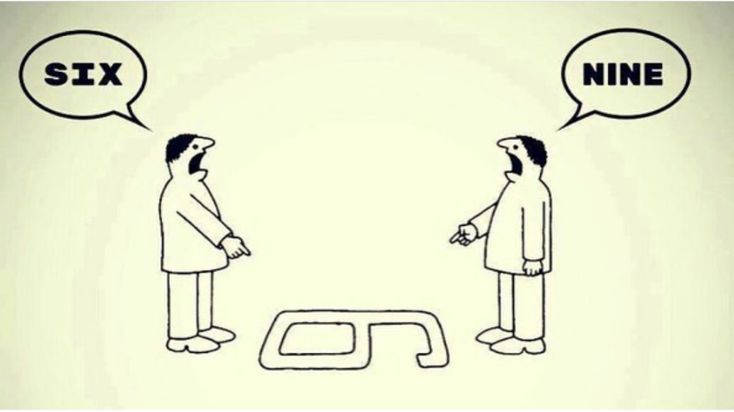It’s All an Illusion

I’m writing this on my birthday, 29th March. It’s one of those ages that you can turn upside down and the numbers are the same. Some of these occur when we’re quite young, other when we’re quite old. I’m somewhere in the middle.
Perhaps because of this I’m prompted to look at things in different ways.
There’s an experiment where two people on opposite sides of a table are looking at a ball suspended between them. They are asked to discuss what they see and decide on the colour of the ball. A fierce argument ensues as one states categorically the ball is red and the other insists it is blue. The truth is half of the ball is red and the other half blue but neither person can see the whole ball.
On a lighter note there’s the joke in the Father Ted comedy sitcom when Ted is attempting to explain to Dougal that “these (model) cows are small, those cows (in the field) are far away”.
When you or I have a decision to make; there are positive and negative arguments, pros and cons, for and against. We look at something from different angles and according to our perceptions, yours and mine, we may or may not come up with different ‘answers’.
Often, like a coin, both sides of the argument actually have the same value. But when you and I toss a coin to make a decision there is always a ‘right’ and a ‘wrong’ according to which way the coin falls – at least as far as you and I are concerned!
Joni Mitchell sang:
“I’ve looked at life from both sides now,
From win and lose but still somehow
It’s life’s illusions I recall
I really don’t know life at all.”
She’s quite correct. What you and I see when we ‘look’ at something really is an illusion.
Whether it’s an object or a scene or if it’s a situation or a question, what you and I ‘see’ or ‘understand’ results from our perceptions of what we ‘see’ which in turn result from the conditioning we have taken on board throughout our lives so far.
Crime scene witnesses rarely come up with the same description of what they ‘saw’, and indeed it’s considered suspicious by investigators if people come up with identical stories.
People have a myriad of different opinions on different subjects. Some people will ‘see’ it one way, other people will take a different ‘view’.
If you’re on the inside of a bottle you can’t see what’s written on the outside of the label and if you live inside a paradigm you’ve developed over the years, it’s difficult to see things other people can see. But of course, everyone has the same problem.
There is no ‘wrong’, there is no ‘right’. It’s not a binary choice. At any one time, different people will have different opinions on what it is they see. And you and I know during our own lives our own opinions on what we see have also changed.
Things not acceptable 50 years ago are now acceptable and even sometimes encouraged, and vice versa.
50 years ago, most people smoked, and it was a normal social practice to offer people a cigarette when you met them and even impolite if you didn’t; now, smoking is illegal in many places and actively discouraged.
You and I and everyone else have our own perspective on life. Much of this perspective consists of self-limiting beliefs about how we are supposed to ‘behave’ and what we are supposed to believe – a result of conditioning over the years by people we know, the media and the culture of the society we live in.
This perspective works like a lens and affects how we ‘see’ things and what decisions we make.
But we can change the lens and look at things from different ‘angles’ using a different set of ‘rules’ or even better, no rules.
Look at ‘it’ (whatever ‘it’ is) from both sides, from inside out or outside in, through a microscope, from top to bottom, back to front, upside down or even ‘through the looking glass’.
Then you’ll stand a chance of understanding what you’re looking at and making a decision about what it is or what to do without being encumbered by what has gone before.
I’m off to start a new year, but I’m clearing out some of the perceptions, conditioning and paradigms I’ve collected on my ‘hard drive’ first.
How about you?
